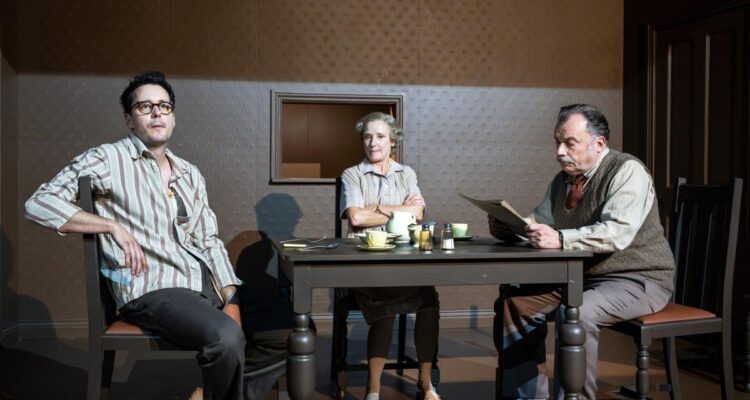The Birthday Party – the story of Stanley, a lodger at a boarding house whose birthday is derailed by the arrival of two threatening strangers – is one of Pinter’s most performed and perennially popular plays, despite its initial critical failure. Like much of Pinter’s work it is a jagged, open-ended work that resists clear interpretation, by turns hilarious and disturbing. In the Ustinov’s production, designer Ultz has dressed everything and everyone in oppressive shades of brown, suggesting both a drearily British sense of mundanity, and that the intruders – despite their markedly more formal suits and ties – are still part of this world, a force of it, rather than something that comes entirely from without.
Jane Horrocks is excellent at Meg: wilfully imbecilic and wide-eyed, pulling herself through the moments that threaten to shake her composure and returning to being delighted by herself and her own machinations. Despite the psychosexual leanings of her games with Stanley, she is an oddly pure presence amongst the rest of it, and we understand entirely Petey’s (Nicolas Tennant) wish to shield her from the fallout at the end of the play. Stanley, played by a physically and comedically adept Sam Swainsbury, begins dishevelled and surly, his derangement – and the real physical threat of him – unfurling within the first act and upending the domestic in typical Pinter fashion. The contrast between his huge, dramatic gestures of the first half and the subdued, zombie-eyed staggering of the second is shocking. Stanley’s silent agonies and Meg’s beatific, childlike pleasure are also contrasted well.
This is a generally very strong cast, and the actors appear completely at ease with the precise rhythm of Pinter’s dialogue and pauses, which is not always the case in productions of his work. Carla Harrison-Hodge is hilariously judgemental in her first scenes as Lulu, and, later on in the play, finds real vulnerability in depth in what is quite a small part. Caolan Byrne is particularly strong when playing the transition between McCann’s nerves pre-job and his absolute confidence once he’s settled into tormenting Stanley – we understand immediately that Stanley is now in some kind of looming danger, just from the shift in his body language and tone. John Marquez projects well Goldberg’s authority and command of the unfolding situation, but is less effective when Goldberg falters, momentarily breaking down as he confronts the extent to which he has simply stuck to the line and done what he’s told. Everybody’s identity is unstable here. Stanley reshapes his own story again and again, and then has it reshaped once more when it’s told by Meg. Goldberg and McCann’s first names change, and their stories of their childhoods fall pathetically into desperate cliché, or images stolen from Stanley.
The ritual humiliation of Stanley in a game of Blind Man’s Buff has oddly modern resonances (reminding me of frat hazing, or the Succession game Boar On The Floor), as does Petey’s futile attempt to cling to routine, his knowledge that the darkness must be shoved away and hidden for as long as possible before it inevitably rises again.
Written by Harold Pinter
Directed by Richard Jones
Cast includes Jane Horrocks, Sam Swainsbury, John Marquez
Until 31 August 2024

